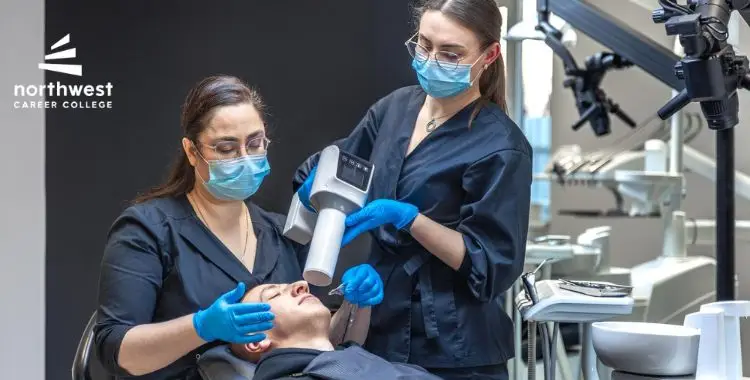Dental Assistant Vs. Dental Hygienist: What’s the Difference?
- Dental Assistant
-
 Authored by
Jessica Vazquez
Authored by
Jessica Vazquez
- Updated November 14, 2025
- 1.7k views
Like many other medical fields, one often comes across two essential role designations if interested in dentistry as a career: Dental Assistant and Dental Hygienist. While both are crucial in a dental office setting, their roles, responsibilities, and training requirements differ.
As one chooses which career path to take, it’s essential to understand the difference between these two positions. Both are advantageous careers, whether you want to become a Dental Assistant or a Dental Hygienist in healthcare.
In this article, we will discuss some of the significant differences between Dental Assistants and Dental Hygienists in terms of day-to-day tasks, required day-to-day skills, and education needed for each. We also show you how to get started on your career path today through the Dental Assistant program at Northwest Career College.

Table of Contents
Dental Assistant’s Role and Responsibilities
A Dental Assistant forms part of a core dental team. They work hand in glove with dentists through various aspects of dental procedures to keep dental offices running smoothly and effectively. More often than not, dental assistants are considered the “heartbeat” of dental practice because they provide the essential support that keeps everything running.
Some of the roles performed by dental assistants include:
- Assisting during dental procedures: The dental assistant may assist the operating dentist during various methods such as filling, crowning, and extraction by handing instruments, holding the mouth of the patient open, or suctioning saliva.
- Preparation of dental equipment and materials: This involves sterilizing instruments, preparing the treatment rooms, and developing all the necessary settings to perform a procedure.
- X-ray: Dental assistants take dental X-rays to help the dentist diagnose oral health problems. They are taught how to handle an X-ray machine safely and accurately.
- Patient care: They put patients at ease, explain procedural aspects, and take medical history.
Your job as a dental assistant will require you to spend quite a lot of time in the dental office, where you will interact face-to-face with patients and often help the dentist. You will also be expected to stay organized, be detail-oriented, and work well under pressure.
What is the Role of a Dental Hygienist?
Dental hygienists also play a vital role in patient care; however, their role is more concentrated on preventing and maintaining oral health. A dental hygienist’s responsibilities include:
- Cleaning teeth.
- Looking for signs and symptoms of the disease.
- Teaching patients proper oral hygiene.
Dental hygienistsTasks performed by dental hygienists include:
- Teeth cleaning: One of the significant duties of a dental hygienist is cleaning patients’ teeth. It involves the removal of plaque, tartar, and stains through special tools, which clean and polish the teeth.
- Examining the teeth and gums of the patients: Dental Hygienists examine the mouth, teeth, and gums to search for decay, disease, or other problems. They might also take X-rays and report to the dentist.
- Preventive treatments: Fluoride treatments and the application of sealants are done by them to prevent decay.
- Patient education in oral health: Dental hygienists teach patients how to best care for their teeth and gums by brushing, flossing, and using mouthwash. They also advise on dietary and lifestyle habits that affect the mouth.
While dental assistants primarily assist during procedures, hygienists often work in preventative measures and cleaning. Dental hygienists spend much of their time working with clients, enabling them to maintain good oral health in the future.
Education and Training Requirements
The most striking difference is the education and training provided to Dental Assistants and Dental Hygienists.
Education and Training for Dental Assistants
Accordingly, the duration of training hours and the time required to become a Dental Assistant are less than that needed to become a Dental Hygienist. Most dental assistant schools take about nine months and combine classroom and clinical training.
The Dental Assistant Program at Northwest Career College merges online learning with hands-on practice in our modern eight-operatory lab to provide students with the essential competencies for taking X-rays, sterilization, patient care, and procedure assistance. At the end of this program, you will be prepared to take your diploma and start working as a certified Dental Assistant.
Although this may vary state by state, many states require Dental Assistants to obtain certification by passing a certification exam. The Certified Dental Assistant (CDA) is one of the most respected credentials, proving one’s knowledge and competence in one’s field.
Dental Hygienist Training and Education
Dental Hygienists take more years of education and training. A Dental Hygienist requires that you finish an accredited Associate’s Degree in Dental Hygiene, which generally takes 2-3 years to get through. The study program includes classroom instruction and clinical skills in oral anatomy, disease prevention, and patient care.
Once you complete your program, you must pass a licensure exam, permitting you to practice as a dental hygienist. Additional continuing education courses might be relevant and even mandatory for maintaining current licensure as determined by your state licensing agency. Generally speaking, Dental hygienists have to possess more advanced clinical skills and knowledge than dental assistants.
Key Differences: Dental Assistant vs. Dental Hygienist
Here’s a quick comparison of the main differences between the two roles:
| Role | Dental Assistant | Dental Hygienist |
| Primary Focus | Assisting with procedures, patient care, and administrative tasks | Preventive care, cleaning teeth, oral health education |
| Education | Diploma program (9 months) | Associate’s Degree (2-3 years) |
| Responsibilities | Sterilizing equipment, taking X-rays, assisting during procedures | Cleaning teeth, applying fluoride, educating patients |
| Certification | May require CDA certification (varies by state) | Requires licensure and board exam |
| Work Environment | Dental offices, clinics, hospitals | Dental offices, some hospitals |
Which Career Path is Right for You?
Which pathway you choose between a dental assistant and a dental hygienist depends upon your interests, career goals, and the amount of time you wish to spend on education. If you want to get started quickly and enjoy working in various roles in the dental office, a Dental Assistant may be an excellent option for you.
On the other hand, if it is working closely with patients to improve oral health by offering them preventive care, then being a Dental Hygienist may be the route for you.
Start Your Dental Assistant Career Today. Get ready to start your career related to dentistry and apply to Northwest Career College to become a dental assistant. From within our hands-on, trained program in the skills department, experiential graduates will be set up for success as a part of a very sought-after healthcare industry. New classes start every month, so you’ll have your diploma and work as a professional dental assistant in just nine months. Enroll and get started on your fulfilling dental career!



